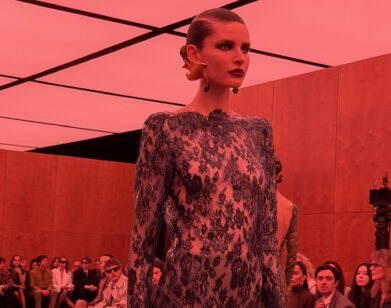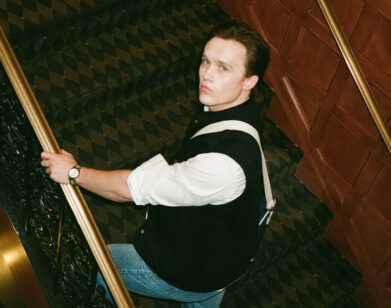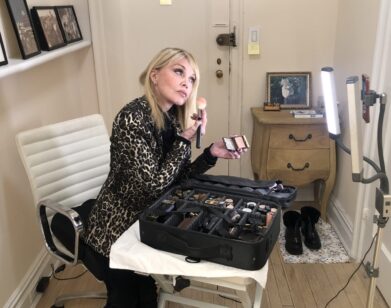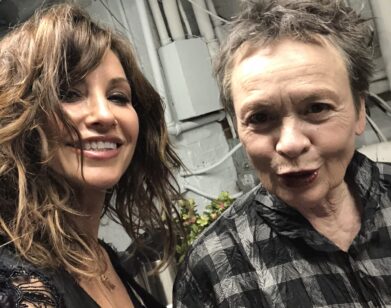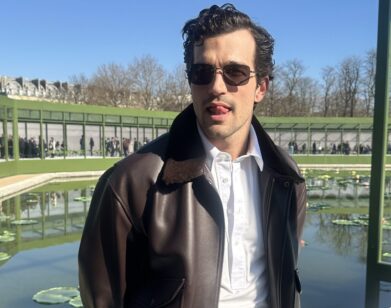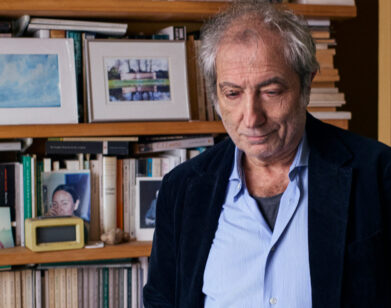Carrie Brownstein and the Mysteries of Portland
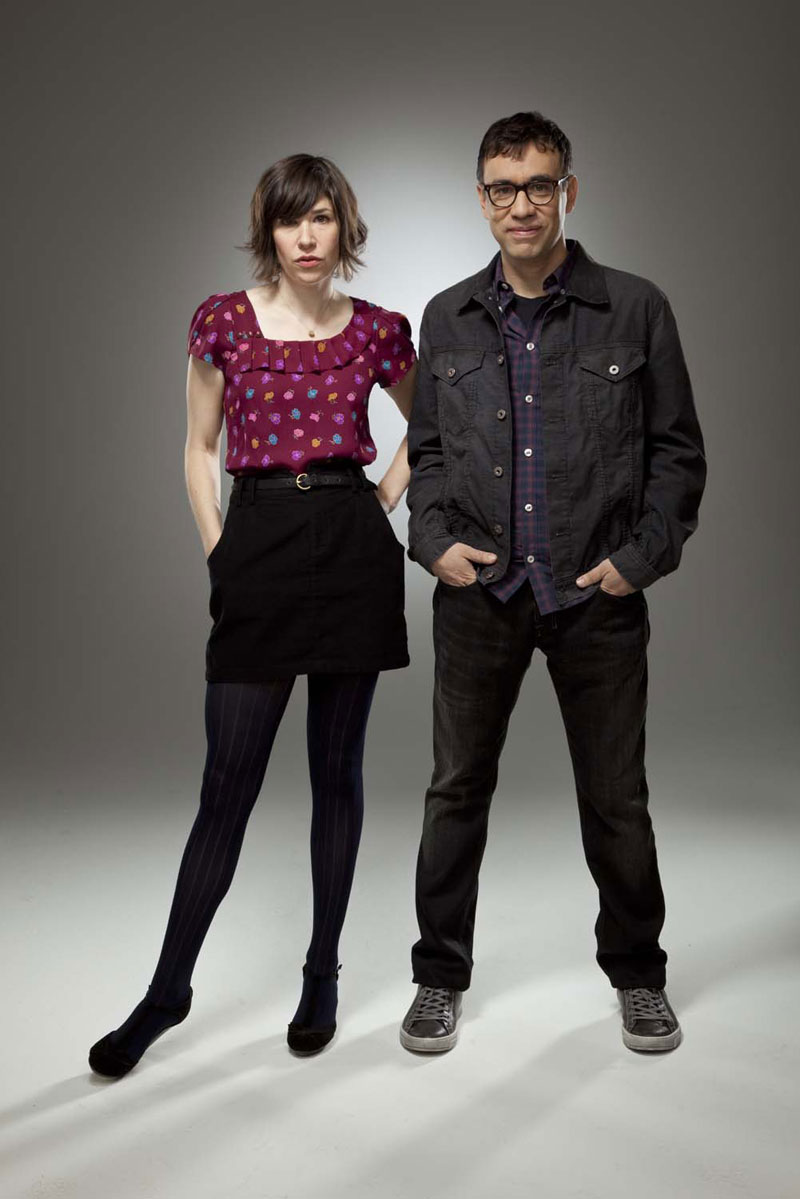
CARRIE BROWNSTEIN (LEFT) WITH FRIEND AND PORTLANDIA CO-STAR FRED ARMISEN.
PHOTO COURTESY OF IFC
In her role as Toni, the co-owner of a feminist bookstore, Carrie Brownstein does not look like someone Rolling Stone readers would rate as one of their 25 most-underrated guitarists (which she is). Toni has long black hair, glasses, and wears chunky-beaded jewelry. She speaks quietly, and there scarcely any rock-‘n-roll snarling about how she’s a “modern girl.”
But there’s more to Carrie Brownstein than meets the eye: the woman still best known as the guitarist for seminal riot-grrrl group Sleater-Kinney is also a writer (for Slate and The Believer, and of an upcoming book called The Sound of Where You Are), an NPR contributor, and most recently, an actress. Toni is just one of the characters Brownstein plays on the six-part series Portlandia, which premieres tomorrow on IFC [watch the first full episode, below]. The Sleater-Kinney guitarist stars in the show with her friend, Saturday Night Live star Fred Armisen. We talked to Brownstein about the connections between music and comedy, the 1990s, and the Pacific Northwest.
ESTHER ZUCKERMAN: Can you tell me about what brought you and Fred Armisen together?
CARRIE BROWNSTEIN: Fred and I met mostly through music. He was in a band called Trenchmouth in the ’90s, and then I was playing with Sleater-Kinney, so we knew each other through mutual friends, but it wasn’t until he was on Saturday Night Live. He invited us to one of the Saturday Night Live after-parties—we were playing a show in New York. After we played, we went to the after-party and he was there, and he was wearing a little Sleater-Kinney button with my face on it. We just had mutual affection for each other and became fast friends and then decided to collaborate.
ZUCKERMAN: Where do you get inspiration for your characters like Toni and Candace from the feminist bookstore? Where do those characters, and other characters we are going to see on Portlandia, come from?
BROWNSTEIN: A lot of them, appearance and wardrobe aside, are aspects of Fred and I. A lot of the different characters have a commonality, which is that especially in progressive communities, there are ideologies, people, and organizations that claim to be very inclusive, and then they make up all these rules of how you can be part of the group and the rules are really hard to follow. You end up feeling so alienated by them, you’re frustrated or you become contrarian. Toni and Candace think they are doing a huge community service and running this really great bookstore, but they barely sell a book to anyone. Sometimes Fred and I portray the people on the outside, trying to figure out the rules.
ZUCKERMAN: You are from the Pacific Northwest, right?
BROWNSTEIN: Yeah.
ZUCKERMAN: Would you ever leave? Why do you think the Pacific Northwest inspires such loyalty?
BROWNSTEIN: I don’t think I would live outside of the Northwest. I think the quality of life in Portland is really good. People move from intense, high-powered jobs, and move to Portland, work half as much and live twice as good. They can afford bigger houses, or they can actually afford to buy a house, they can work the minimal amount and still get by. I think there’s a really strong sense of community there. It’s beautiful. You’re situated with Mount Hood to the East, and you have the river running through downtown and you have the ocean 70 miles to the west. It’s a pretty magical place, and I think people do get attached to it, and it has a strong entrepreneurial spirit, which I think is just part of the west anyway, but you can go to Portland and you can start your own business and you can do things in untraditional ways and be celebrated for that. I think a lot of people are attracted to that idea.
ZUCKERMAN: Is that one of the reasons that it breeds these characters that you can portray on the show and in your comedy duo ThunderAnt?
BROWNSTEIN: Yeah, I think a lot of the characters embody that spirit. They are sort of obsessing over small things, [whereas] maybe in other cities there would be bigger problems to deal with. We like to explore the awkward moments and that moment where you fumble and have to regain yourself. A lot of the characters are struggling with that.
ZUCKERMAN: Both you and Fred are musicians turned comedians to a certain extent. Did you ever think you would get involved in comedy when you were in Sleater-Kinney?
BROWNSTEIN: No. I didn’t. The process of forming ThunderAnt with Fred was as organic as forming a band, and the process was long and very natural. We spent many years working on something that was just for us. It was the same way you would form a band and just play for your friends, I think because it wasn’t a fast transition, in that we’ve been doing this for five years before IFC decided to make it a show. By then I was very comfortable with the dynamic. Fred and I are such good friends, and a lot of the chemistry and the dialogue and the situations stem from our own lives and conversations we’ve had.
ZUCKERMAN: Has playing music influenced your ability to do comedy? Is there anything you learned from performing with Sleater-Kinney that you could specifically bring to comedy?
BROWNSTEIN: Certainly, I think in terms of improvisation. With Sleater-Kinney, we did a lot of improvisation in our live shows, and even our process of songwriting involved bringing in disparate parts and putting them together to form something cohesive. I do think the notion of improv was not completely foreign, so that helped. I think also just years of being on stage in Sleater-Kinney just gave me an inherent confidence in terms of performing, being on stage, being in front of people. So I don’t think I would have been able to do this 10 years ago.
ZUCKERMAN: How much of the show is improvised?
BROWNSTEIN: The show is about 95 percent improvised. It’s highly, highly improvised. We brainstorm an idea and then we do flesh it out a little bit—we come up with a script, mostly to have beats and a sense of a story and a narrative arc. Often when we get into the space and onto the location, that changes and something we discover in the moment becomes the moment, becomes the story, becomes the character. A lot of things change. It’s a testament to our crew and to our director, Jonathan Krisel, and IFC that they trusted that it would still be funny even if we didn’t stick exactly to the script.
ZUCKERMAN: Did the same go through the ThunderAnt sketches, or were those even more improvised?
BROWNSTEIN: Yeah, ThunderAnt was literally, Fred shows up to Portland, for 10 minutes we think about an idea, we call a location and ask if we can shoot there the next day, we shoot there the next day—that was ThunderAnt. Portlandia is add a week to that, slash 40 crew people.
ZUCKERMAN: In the first episode of the series, there is a song with the chorus: “The dream of the ’90s is alive in Portland.” What exactly is the dream of the ’90s? Do you think it was realized?
BROWNSTEIN: I do think a little bit of the dream of the ’90s is outlined in that song. The “Dream of the ’90s” was a video and sketch that our director Jonathan Krisel came up with after spending a couple of days in Portland. He just felt he was walking around and living in a time capsule. There was this Clintonian optimism that existed in the ’90s—it was pre-9/11, and we were only going to move forward, and nothing was going to stop us, and there was just a sense of weirdness and freedom. A lot of people decided to interpret that and express that through their outfits and through their circus and juggling and through their nose piercings. There was this kind of wackiness that was really embraced and put on a pedestal. It was before the millennium. We were envisioning a future that was mostly idealistic. I think that came crashing down a little bit in 9/11, or a lot. There is something about Portland that does seem to still exist in this total idealistic world and total idealistic mind frame, and I think that’s what it’s talking about.
PORTLANDIA PREMIERES TOMORROW NIGHT ON IFC AT 10:30 P.M. EST.

